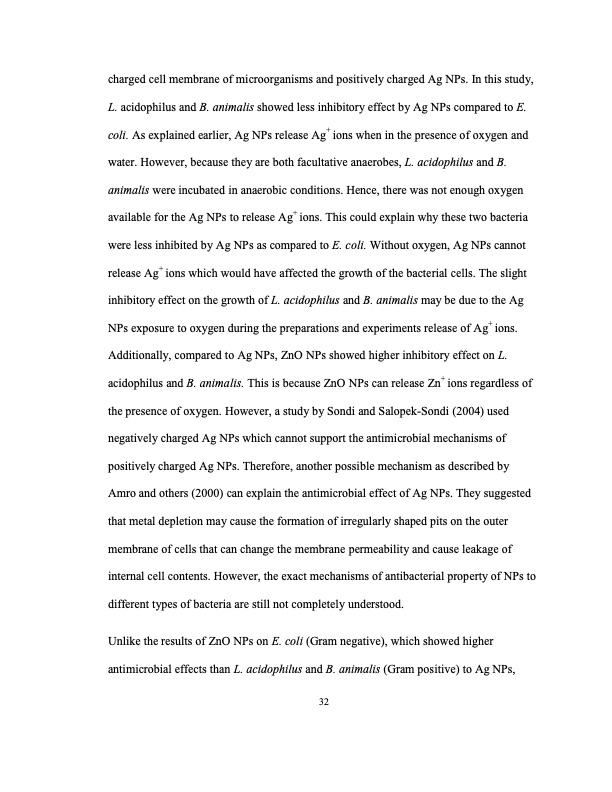
PDF Publication Title:
Text from PDF Page: 043
charged cell membrane of microorganisms and positively charged Ag NPs. In this study, L. acidophilus and B. animalis showed less inhibitory effect by Ag NPs compared to E. coli. As explained earlier, Ag NPs release Ag+ ions when in the presence of oxygen and water. However, because they are both facultative anaerobes, L. acidophilus and B. animalis were incubated in anaerobic conditions. Hence, there was not enough oxygen available for the Ag NPs to release Ag+ ions. This could explain why these two bacteria were less inhibited by Ag NPs as compared to E. coli. Without oxygen, Ag NPs cannot release Ag+ ions which would have affected the growth of the bacterial cells. The slight inhibitory effect on the growth of L. acidophilus and B. animalis may be due to the Ag NPs exposure to oxygen during the preparations and experiments release of Ag+ ions. Additionally, compared to Ag NPs, ZnO NPs showed higher inhibitory effect on L. acidophilus and B. animalis. This is because ZnO NPs can release Zn+ ions regardless of the presence of oxygen. However, a study by Sondi and Salopek-Sondi (2004) used negatively charged Ag NPs which cannot support the antimicrobial mechanisms of positively charged Ag NPs. Therefore, another possible mechanism as described by Amro and others (2000) can explain the antimicrobial effect of Ag NPs. They suggested that metal depletion may cause the formation of irregularly shaped pits on the outer membrane of cells that can change the membrane permeability and cause leakage of internal cell contents. However, the exact mechanisms of antibacterial property of NPs to different types of bacteria are still not completely understood. Unlike the results of ZnO NPs on E. coli (Gram negative), which showed higher antimicrobial effects than L. acidophilus and B. animalis (Gram positive) to Ag NPs, 32PDF Image | ZINC OXIDE AND SILVER NANOPARTICLES ON INTESTINAL BACTERIA

PDF Search Title:
ZINC OXIDE AND SILVER NANOPARTICLES ON INTESTINAL BACTERIAOriginal File Name Searched:
thesis-zinc-oxide-silver-nano.pdfDIY PDF Search: Google It | Yahoo | Bing
Turbine and System Plans CAD CAM: Special for this month, any plans are $10,000 for complete Cad/Cam blueprints. License is for one build. Try before you buy a production license. More Info
Waste Heat Power Technology: Organic Rankine Cycle uses waste heat to make electricity, shaft horsepower and cooling. More Info
All Turbine and System Products: Infinity Turbine ORD systems, turbine generator sets, build plans and more to use your waste heat from 30C to 100C. More Info
CO2 Phase Change Demonstrator: CO2 goes supercritical at 30 C. This is a experimental platform which you can use to demonstrate phase change with low heat. Includes integration area for small CO2 turbine, static generator, and more. This can also be used for a GTL Gas to Liquids experimental platform. More Info
Introducing the Infinity Turbine Products Infinity Turbine develops and builds systems for making power from waste heat. It also is working on innovative strategies for storing, making, and deploying energy. More Info
Need Strategy? Use our Consulting and analyst services Infinity Turbine LLC is pleased to announce its consulting and analyst services. We have worked in the renewable energy industry as a researcher, developing sales and markets, along with may inventions and innovations. More Info
Made in USA with Global Energy Millennial Web Engine These pages were made with the Global Energy Web PDF Engine using Filemaker (Claris) software.
Infinity Turbine Developing Spinning Disc Reactor SDR or Spinning Disc Reactors reduce processing time for liquid production of Silver Nanoparticles.
| CONTACT TEL: 608-238-6001 Email: greg@infinityturbine.com | RSS | AMP |